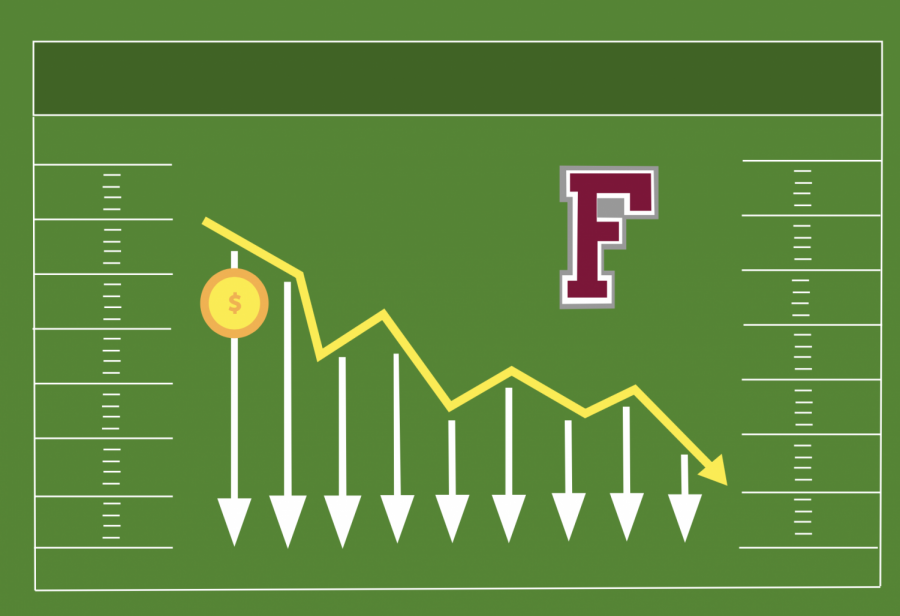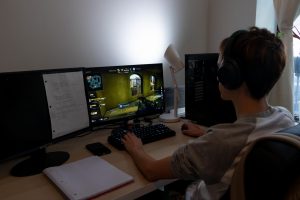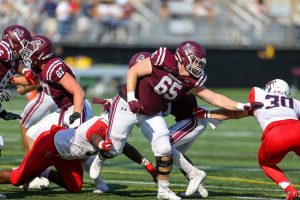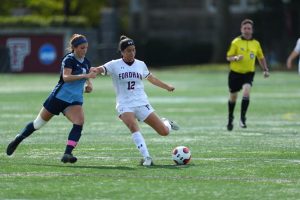Pandemic Passes and COVID Catches: Fordham Sports During the Fall
September 19, 2020
The pandemic has rendered the world of sports as vulnerable as the sale of toilet paper. In recent years, NCAA programs have already had to grapple with the tough ethical question of profiting off of unpaid students, but now the health and safety of these students are being put in jeopardy.
While some schools resumed action this fall, Fordham University, in conjunction with the NCAA and Atlantic 10 (A10) conference, made the health-conscious choice, cutting off one of its most important revenue streams in order to ensure the safety of student-athletes.
Before the fall season, the pandemic had already caused several postponements, as last year’s men’s A10 basketball tournament was cut short while the women’s National Invitational Tournament (NIT) was canceled completely. The cancellations continued into the spring and now the fall, with this year’s Patriot League football season being tentatively postponed without a set return date.
Kull mentioned that the NCAA has discussed forming a potential “bubble” in an attempt to protect the health and safety of the athletes while still proceeding with the sporting seasons.
Despite not being a university currently known for its sports, Fordham still prides itself on its long history of athletic success and the well-roundedness of its student-athletes.
In an interview with The Observer, Interim Athletic Director Ed Kull discussed the success of the school’s athletes, saying, “I’ve been really blown away by that in terms of what the department represents, and the type of student-athlete that is being recruited throughout the country and even internationally by our coaches.”
However, the pandemic has impacted student-athletes tremendously and Kull said that he felt “horrible” to see seniors from the 2019-20 academic year graduate without completing their final season. More importantly, he said that he’s been tirelessly exploring options so that such a disappointing experience doesn’t befall this year’s graduating class as well.
As the NBA and NHL have done, Kull mentioned that the NCAA has discussed forming a potential “bubble” in an attempt to protect the health and safety of the athletes while still proceeding with the sporting seasons. These bubbles have typically been set up at hotels or resorts, and would contain the athletes, coaches, referees and other necessary personnel while preventing any outside contact.
However, the struggle with forming a bubble for collegiate athletes in any sport is the necessity for hundreds of universities and thousands of athletes across different conferences to be accommodated and accounted for as opposed to the 30 or so teams in leagues like the NBA and NHL. With a sport like college football, it would simply be impossible to achieve.
However, Kull is looking toward the unique opportunity that colleges have as opposed to the pros: a winter break from classes.
The director sees this as a potential way for a basketball season to go on as planned, asking, “Is there an opportunity in the month of December where there are also no classes to try to have some college basketball games be played, whether in a bubble or in the safe way?”
Not only will these changes impact the student-athletes on campus, but the university may also have to spend more money if the A10 chooses to resume play. If the idea of a bubble does come to fruition, it won’t come with a cheap price tag. While the professional leagues currently enacting a bubble have invested hundreds of millions of dollars into their pandemic plans, the NCAA will have to face similar expenses.
The money required for that effort would come from the NCAA and A10 in part, but it’s hard to imagine a scenario where the university would be able to play without contributing money to the massive effort.
Despite the temptation of an idea as grandiose as a bubble, the current plan is still to reschedule fall sports for the spring while winter and spring sports return as normal, assuming the force of the pandemic diminishes.
Regarding the plan, Kull stressed that the administration was remaining cautious, saying, “But as you know, with COVID, it’s been a wild ride for six months. We’re just trying to monitor that and go slowly in terms of what it means in terms of winter sports, which are still currently in play.”
If it goes on as planned, the college basketball season is only two months away, a very tight deadline considering current health guidelines. The NCAA plans to release official guidelines later this week, but Kull said that rumors are already swirling that the winter season will be delayed by a few weeks.
In terms of revenue, the loss of basketball could be particularly damaging for Fordham.
With COVID, it’s been a wild ride for six months. We’re just trying to monitor that and go slowly in terms of what it means in terms of winter sports, which are still currently in play. Ed Kull, interim athletic director
One might assume that football would be the most significant revenue earner for Fordham, since college football is often a school’s lifeblood. By canceling their football season, Sports Illustrated reported that Pennsylvania State University could lose up to $100 million this year. However, while Fordham still stands to lose money, the gridiron losses aren’t quite as severe.
For Fordham in the Patriot League, Kull said, “There is not the TV deal or the TV network … and even at Coffey Field in terms of football, you know, it probably could hold comfortably 6,000 seats when it’s sold out. It’s not 126,000 like Ohio State or Michigan or an SEC.”
Instead, Kull pointed out that Fordham’s financial losses would actually be more significant if the basketball season was postponed. Unlike the football team in the Patriot League, the basketball teams play in the A10 and have a TV deal through the conference with ESPN+. The women’s team has even made it to the national stage on several occasions in recent seasons.
Last year, the men’s A10 Tournament was cut short, while the women were invited to the NIT before it was canceled. Kull described a trickle down effect when these cancellations occurred. The conferences and hosting organizations lost money by canceling, and this led to the loss of significant NCAA revenue distribution for all the teams involved, including Fordham.
Kull described that loss of money earlier this year as “significant,” and there were effectively only a few games remaining on both basketball teams’ schedules. If the seasons were canceled completely, the school would miss out on revenue from several months’ worth of basketball games.
With so many potential forms of income being cut off, fundraising is becoming an increasingly important area for Kull and his department. The director expressed concern that donors would not be as enthusiastic without sports on the schedule, but described a “creative” and “engaging” approach to bring in money for the school at a time in which options are limited.
In the world of college sports, current events are uncertain, the potential ramifications will be damaging and plans to move forward are still up in the air. This isn’t the best time to be the interim athletic director, but Kull has managed to keep a steady hand by keeping the student-athletes’ experiences in mind.
The fairly new athletic director has been inspired by those around him at Fordham, saying, “Our coaches have done a great job in terms of developing our student athletes. And I’ll be honest with you … we really have an incredible, incredibly well rounded student athlete.” It’s this student-driven mindset that the director intends to maintain as he continues to venture forward through this challenging landscape.
Hear more about this story on Retrospect:
https://open.spotify.com/episode/4PrxQVuxm6Jvxq0FJITHuW?si=kLypO2ohTvajKqdJcU8isQ
















